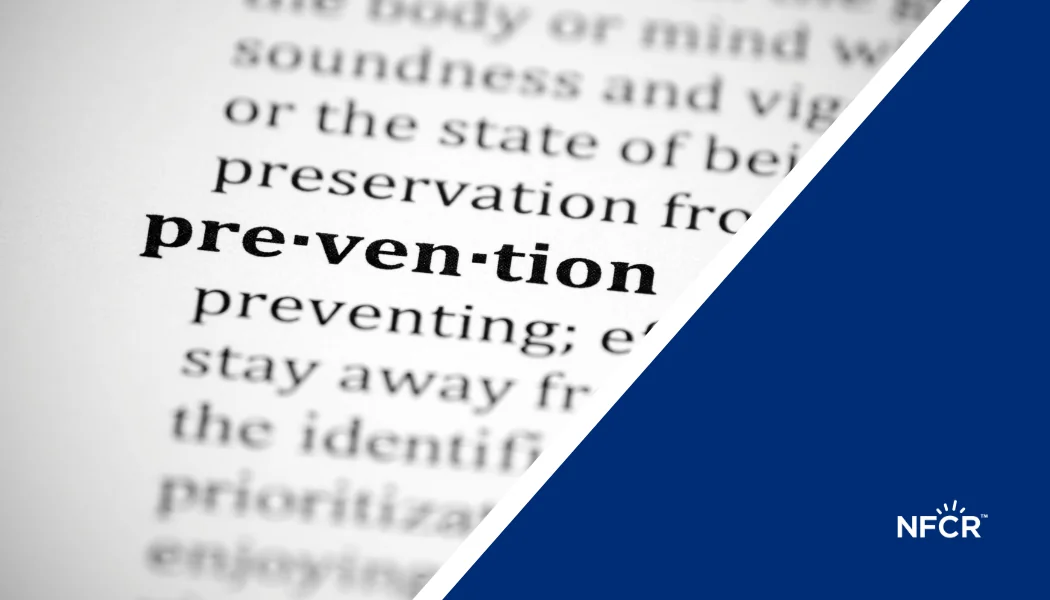Cancer Intervention vs. Prevention: What Does it Mean?
Understand the differences between prevention and intervention and the impacts of each area of research.

The National Foundation for Cancer Research (NFCR), a leader in funding cancer research for over 51 years, has been championing the prioritization of cancer intervention and prevention research. There are a few critical differences between intervening and preventing cancer.
What is Cancer Intervention?
Cancer intervention means finding and treating tumors at the earliest stages before extensive growth or spread. This involves:
- Developing and advancing screening tests for microscopic tumors through enhanced imaging and new biomarkers. NFCR helps fund the improvement of detection technologies and the identification of early-warning molecular signs.
- Testing precision therapies tailored to destroy the first cancerous cells by targeting specific genetic changes. NFCR provides grants for researchers on innovative early cancer treatments.
- Investigating if lifestyle changes and medications can halt progression when precancerous abnormalities emerge. NFCR supports research on how diet, exercise, and anti-cancer drugs might neutralize early lesions.
- Intervening quickly when cellular abnormalities first appear can transform outcomes by stopping cancer before proliferation and metastasis.
What is Cancer Prevention?
Cancer prevention refers to approaches that proactively reduce the likelihood of developing the disease. This includes:
- Adopting lifestyle choices to avoid risk factors like tobacco use. Everyday prevention behaviors such as eating cancer-fighting foods and meeting physical activity guidelines can help the immune system fight off cancer.
- Undergoing regular screening exams, especially for high-risk populations with a family cancer history, to find and remove precancerous lesions before they turn malignant. NFCR provides recommendations on optimal early detection approaches.
- Minimizing intake of carcinogens, optimizing protective compounds, and supporting overall body function through a nutritious, balanced diet tailored to individual risks.
- Funding chemoprevention research on natural compounds or drugs that may lower risk. NFCR funds research on and helps to analyze the cancer prevention potential of antioxidants, aspirin and other agents.
Why Is It Critical to Focus Research on Early Intervention?
Prevention is the best weapon against cancer. Worldwide research studies over many years indicate roughly 30-40% of cancer diagnoses could be prevented by modest diet and lifestyle changes. NFCR publishes information about key food groups with cancer-fighting properties. The goals are minimizing intake of carcinogens, optimizing protective compounds, and supporting overall body function through a nutritious, balanced diet tailored to individual risks.
Early screening enhancements for cancer help us find the first signs of cancer before it spreads and kills. However, once cancer is detected, intervening early allows scientists and clinicians to give patients a strong chance to destroy the first cancer cells present and eliminate cancer before advanced disease develops.
Boosted early screening and precision treatments tailored to the genetics of these initial cancer cells improve outcomes dramatically compared to late diagnosis. Finding and treating emerging tumors swiftly and thoroughly at the root cause will transform how we conquer humanity’s oldest diseases.
NFCR believes early cancer intervention breakthroughs bring us closer to our ultimate mission – a world without cancer deaths.
The Future is Early
Early screening enhancements and therapies customized to root out the first signs of cancer provide hope that one day, lifelong management or even cure is possible. NFCR continues working toward a future where all cancers can be prevented – but also where early intervention saves lives right now. Finding and treating emerging tumors swiftly and thoroughly at the source will transform how we conquer humanity’s oldest diseases.
5 highlights from the NFCR’s “Eating for Cancer Prevention” Tips:

- Stick to whole foods and avoid processed foods with additives like nitrates, nitrites, carrageenan, BHA and BHT which have carcinogenic properties.
- Limit red meat and alcohol intake, as cooking meat at high temperatures and alcohol metabolism produces carcinogens.
- Eat plenty of fruits and vegetables, which provide antioxidants to protect cells, fiber to remove toxins, and anti-cancer micronutrients like vitamins A, C, D and K2.
- Consume nuts, seeds, whole grains and fatty fish for healthy fats and phytonutrients. Spices like turmeric contain anti-cancer compounds. Specific compounds like EGCG (found in green tea) and lycopene (found in tomatoes, carrots, bell peppers, watermelon and other red or orange fruits and vegetables) demonstrate anti-cancer benefits.
- Maintain energy balance by not overeating. Obesity increases cancer risk. Match calories consumed to daily needs.












